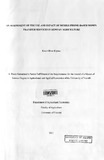| dc.description.abstract | Smallholder farmer access to agricultural finance has been a major constraint to agricultural
commercialization in developing countries. Agricultural finance markets often fail for smallholder farmers due to the high transaction costs of lending such farmers. The leT revolution in Africa has however brought an opportunity to ease this constraint. The mobile phone-based money transfer services that started in Kenyan urban centres have spread to rural areas. Using these services farmers can receive funds to invest in agricultural transactions among other things. Farmers may also hold their small savings in electronic form for subsequent banking. The use of mobile phone-based money transfer services has grown tremendously in urban areas. However little is known about the awareness and use of such services by rural farm households and their effects on households that use them. This study examined the awareness, use and impact of mobile phone-based money transfer services among rural farmers in Kenya. It used descriptive analysis to assess the awareness and regression techniques to examine conditioners of use of mobile phone-based money transfer services. In particular, the study used a Logit and Negative binomial models to examine the factors driving the use and intensity of use of mobile phone-based money transfer services, respectively. It then used propensity score matching to assess the impact of using mobile phone-based money transfer services on smallholder households' percapita input usage and income and consequently commercialization. The study used data collected via personal interviews using pre-tested questionnaires in Kirinyaga, Bungoma and Migori districts. These areas were purposively selected to represent diverse social, cultural and economic backgrounds and capture differences in agricultural potential. It used probability proportionate to size sampling technique to collect information from 379 respondents stratified by participation in leT-based projects (162 participants and 216 non participants). The study finds high awareness (96 percent) of mobile phone-based money transfer services
i.
IV
among the smallholder farmers. However, this has not translated into high usage. Only 52 percent of the respondents have used mobile phone-based money transfer services. Results indicate higher usage in the higher potential areas of Kirinyaga district than the rest of the study areas. Results of the regression analysis indicate that education, distance to a commercial bank, membership to farmer organizations, and distance to the mobile phone¬based money transfer agent and endowment with physical and financial assets affect the use of mobile phone-based money transfer services. Intensity of use of mobile phone-based money transfer services is on the other hand affected by age, education, membership to farmer group, distance to the nearest commercial bank, distance to the nearest mobile phone¬based money transfer agent, number of enterprises and and endowment with physical and financial assets. Lastly results show that use of mobile phone-based money transfer services increased level of household commercialization by 37 percent and annual per capita household income by Ksh. 34, 720. The implication of these findings is that use of mobile phone-based money transfer services resolves one idiosyncratic market failures farmers face namely, access to financial services for use in agriculture. Findings of this study also imply that the use of mobile phone-based money transfer services can spur smallholder commercialization and improve welfare of such households. Consequently, there is need to expand the coverage of mobile phone-based money transfer services in rural areas. | en |

